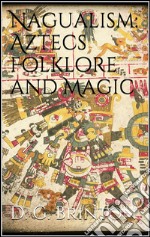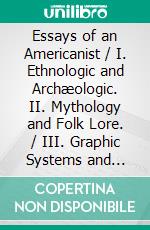Daniel G Brinton eBooks
eBooks di Daniel G Brinton di Formato Mobipocket
Nagualism: aztecs folklore and magic. E-book. Formato Mobipocket Daniel G. Brinton - Pubme, 2015 -
The words, a nagual, nagualism, a nagualist, have been current in English prose for more than seventy years; they are found during that time in a variety of books published in England and the United States,4-* yet are not to be discovered in any dictionary of the English language; nor has Nagualism a place in any of the numerous encyclopædias or “Conversation Lexicons,” in English, French, German or Spanish. This is not owing to its lack of importance, since for two hundred years past, as I shall show, it has been recognized as a cult, no less powerful than mysterious, which united many and diverse tribes of Mexico and Central America into organized opposition against the government and the religion which had been introduced from Europe; whose members had acquired and were bound together by strange faculties and an occult learning, which placed them on a par with the famed thaumaturgists and theodidacts of the Old World; and which preserved even into our own days the thoughts and forms of a long suppressed ritual.
Essays of an Americanist / I. Ethnologic and Archæologic. II. Mythology and Folk Lore. / III. Graphic Systems and Literature. IV. Linguistic.. E-book. Formato Mobipocket Daniel G. Brinton - Ionlineshopping.Com, 2018 -
The word “Essays” appears on the title of this book in the sense in which old Montaigne employed it—attempts, endeavors. The articles which make up the volume have been collected from many scattered sources, to which I have from time to time contributed them, for the definite purpose of endeavoring to vindicate certain opinions about debated subjects concerning the ancient population of the American continent. In a number of points, as for example in the antiquity of man upon this continent, in the specific distinction of an American race, in the generic similarity of its languages, in recognizing its mythology as often abstract and symbolic, in the phonetic character of some of its graphic methods, in believing that its tribes possessed considerable poetic feeling, in maintaining the absolute autochthony of their culture—in these and in many other points referred to in the following pages I am at variance with most modern anthropologists; and these essays are to show more fully and connectedly than could their separate publication, what are my grounds for such opinions. There is a prevailing tendency among ethnologists of to-day to underrate the psychology of savage life. This error arises partly from an unwillingness to go beyond merely physical investigations, partly from judging of the ancient condition of a tribe by that of its modern and degenerate representatives, partly from inability to speak its tongue and to gain the real sense of its expressions, partly from preconceived theories as to what a savage might be expected to know and feel. As against this error I have essayed to show that among very rude tribes we find sentiments of a high character, proving a mental nature of excellent capacity in certain directions. Several of the Essays have not previously appeared in print, and others have been substantially re-written, so as to bring them up to the latest researches in their special fields. Nevertheless, the reader will find a certain amount of repetition in several of them, a defect which I hope is compensated by the greater clearness which this repetition gives to the special subject discussed.

